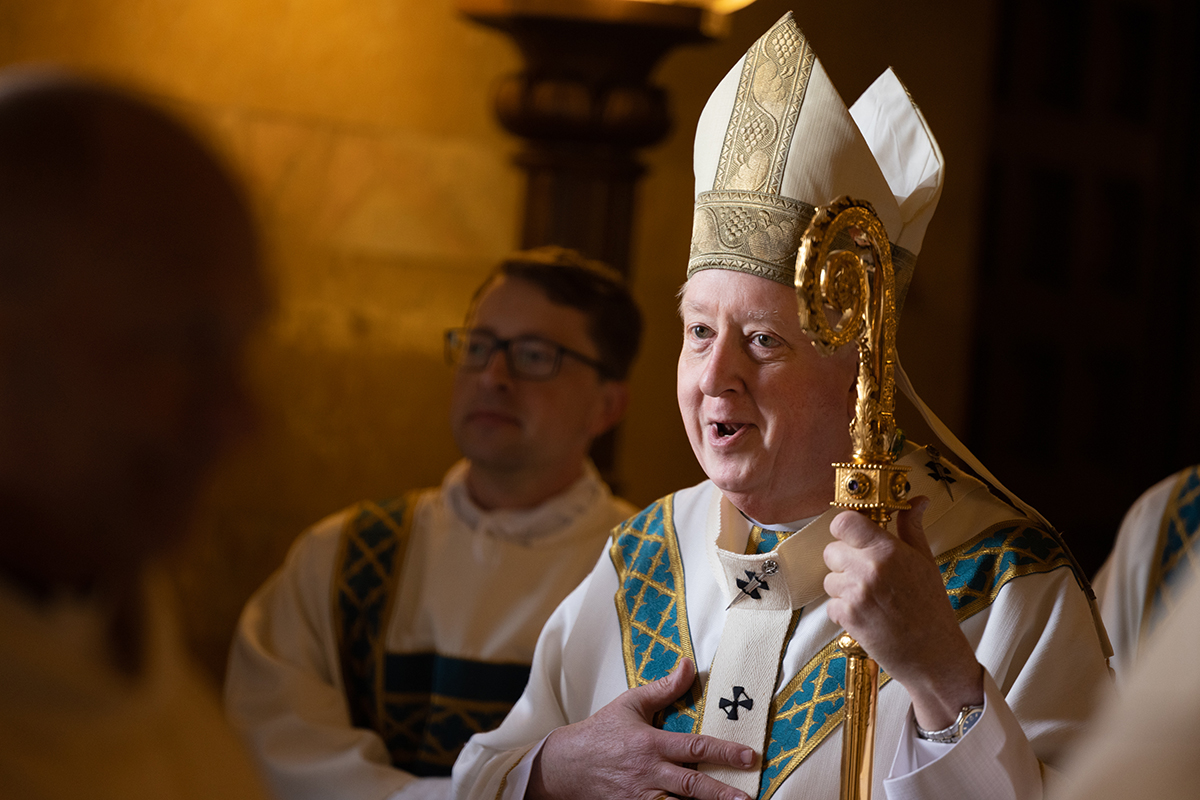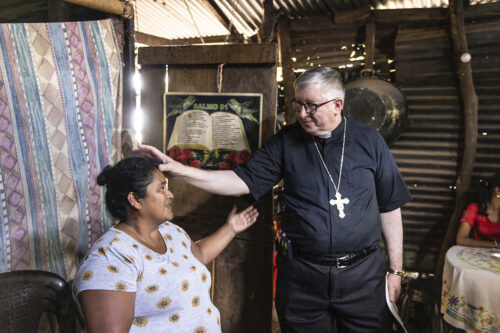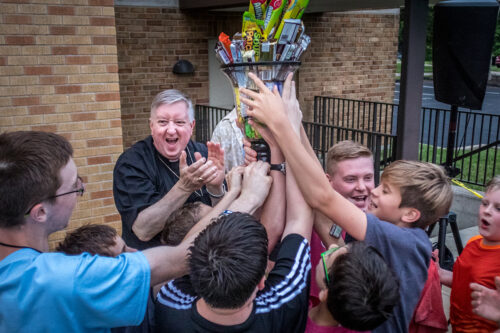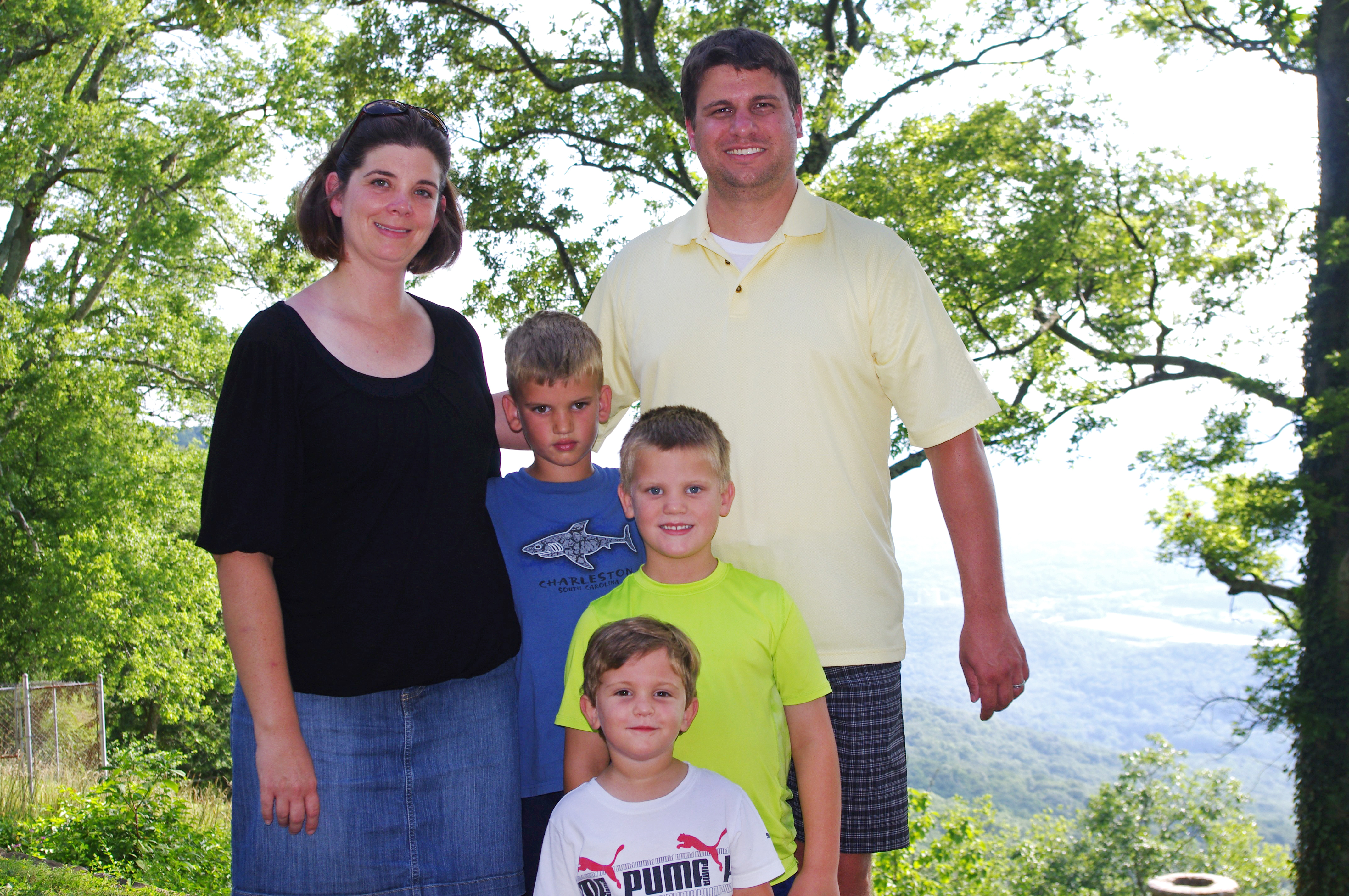Archbishop Rozanski reflects on God’s grace through five years as archbishop of St. Louis

Archbishop Rozanski reflects on God’s grace through five years as archbishop of St. Louis
As Archbishop Mitchell T. Rozanski reflects on his five years as archbishop of St. Louis, one word that comes up often is “grateful.”
Archbishop Rozanski was installed as the archdiocese’s 10th archbishop on Aug. 25, 2020 — the feast of St. Louis IX — at the Cathedral Basilica of Saint Louis, celebrating with a smaller crowd than usual during the COVID-19 pandemic.

Archbishop Rozanski walked with Joyce Jones, director of the Office of Racial Harmony and Black Catholic Ministries, in the inaugural Maafa procession in June 2022 on the grounds of the Gateway Arch.
“I’m just grateful to God for the call He’s given to me to serve as a priest in the Church, to serve as a bishop and leading me to places where I never expected to be — a role I never expected in my priesthood — but for the grace that He gives me to live out my life as a priest and bishop,” he said. “I’m very, very grateful for that over these five years and having the opportunity to be here in St. Louis and to serve the Church here.”
During an interview marking the first anniversary of his installation, Archbishop Rozanski summed up his top pastoral priority simply: proclaiming the Gospel and helping others to do the same.
That mission has remained his priority, including through the All Things New pastoral planning process that kicked off less than a year later.
“As we began the planning for All Things New, the goal was, how do we as a Church proclaim the Gospel in the 21st century, and what structures do we really need to help us do that?” Archbishop Rozanski said. “…I certainly knew but became very more appreciative of the fact that leadership involves difficult decisions, and those decisions are necessary if we are to move forward as a Church in proclaiming the Gospel.”
Archbishop Rozanski followed the All Things New parish announcements in 2023 with a document further laying out his pastoral vision for the archdiocese, titled “Disciples Make Disciples.” He’s been grateful to hear stories from laity in parishes and Catholic schools about their own journeys of discipleship, he said.

Archbishop Rozanski offered a blessing during a Cross Catholic Outreach trip to Guatemala in January 2025 for his role as board chairman of Cross Catholic Outreach.
At the beginning of the 2024-25 school year, St. Louis Catholic Academy moved into a new campus on Jefferson Avenue in north St. Louis to serve nearly 200 children in grades K-8. On Pentecost, 18 students and family members received sacraments of initiation — the result of personal invitations by staff to each school family.
“I’ve run into some folks who have shared with me that until we started All Things New, they never looked upon themselves as evangelizers, that evangelization was something either that the religious did or the ordained did, and they never looked upon themselves as laity as part of the evangelization efforts of the Church,” Archbishop Rozanski said. “So I think what All Things New did, and ‘Disciples Make Disciples,’ is raise our awareness of what it means to be able to share one’s faith and to invite others into the faith. Jesus didn’t tell His disciples at the Ascension to go and keep this all to themselves. He told them to go out and preach the Good News, and that’s what Jesus is still telling us to do today: Go out and preach the Good News.”
An incarnational Church
Not long after arriving in St. Louis, Archbishop Rozanski started meeting with an ecumenical group of faith leaders that became known as the Oikos Group. It began as an opportunity to gather for prayer and open conversation, but the leaders soon honed in on a common goal: increasing affordable housing in the St. Louis region.
“The Church comes from the birth and the life and the public ministry and the death and resurrection of Jesus Christ, who took on our own humanity. We know that’s a basic tenet of our faith. That’s incarnational theology, and so as the Church seeks to bring the Good News of salvation to the world, we also seek to take care of those needs of people,” Archbishop Rozanski said. “When missionaries first went in to foreign lands, they didn’t build a church first — they might have built a hospital or a place for people to have healing. Housing is a very crucial need in our community, and so the Church has to be at the forefront of making sure that people have a place where they can feel safe, secure, and then they can live their lives in that security that really is our basic human dignity.”
Archbishop Rozanski’s focus on housing has taken root in other ways in the archdiocese, too. At his urging, the Annual Catholic Appeal established a dedicated Affordable Housing Fund. Catholic Charities of the Archdiocese of St. Louis created Catholic Charities Housing as a new entity in 2024, with affordable housing projects underway in Troy and Festus, and has also been a partner in projects including Life’s River in Washington and Bridge of Hope in Troy.

Archbishop Rozanski congratulated the “Red Hot Warrior Fire Chickens,” winners of the Kenrick Glennon Days water olympics at Kenrick-Glennon Seminary in Shrewsbury in 2021.
Several other initiatives in the archdiocese also seek to increase respect for all human life and provide for the needs of vulnerable people, Archbishop Rozanski said. During his time in St. Louis, the state has seen major abortion-related legal decisions, including the 2022 Dobbs decision overturning Roe v. Wade and triggering an abortion ban in Missouri and the passage of Amendment 3 last fall and subsequent legal battle to resume abortions in the state.
Through the ups and downs of legal decisions, the Church in St. Louis continues to offer both abortion healing ministry and resources for pregnant mothers and families, the archbishop noted. He remembers when the national Walking With Moms in Need initiative was proposed by St. Louis-native Archbishop Joseph F. Naumann, who at the time was head of the USCCB Committee on Pro-Life Activities.
“I think that really resonated with us (bishops), that we as a pro-life Church need to walk along and accompany people in those moments that might be very difficult for them,” he said. “(It’s) part of really the whole spectrum of who we are in proclaiming life and the importance of life and dignity.”
The archdiocese hosted a gun violence summit in 2023, followed by establishing the archbishop’s task force on gun violence prevention. The task force has focused on education, awareness and this year partnered with local agencies to offer free gun locks in parishes around the archdiocese. Gun violence “tears at the fabric of our society,” Archbishop Rozanski said, so it’s important for the Church to speak out.
“The Church needs to be involved in any situation that attacks human life, and we see how gun violence has really attacked the quality of our human life — shattered individual lives, shattered families, and it just has broken down so many lives because of the violence,” he said. “So the Church has to be there, speaking on behalf of life, on behalf of redemption and salvation, and as we do that, we hope to bring people’s awareness of what it means to be responsible, particularly for gun ownership.”
In 2022, the archdiocese hosted its first Maafa prayer service and procession memorializing the lives of those lost during the transatlantic slave trade. Archbishop Rozanski has participated in the annual Maafa event every year. In 2024, a 95-page June 2024 report, “Slavery in the Historic Archdiocese of St. Louis,” was released, detailing the role of the local Church in the institution of slavery.
Archbishop Rozanski grew up in Baltimore, which has its own fair share of historical — and ongoing — racial justice issues, he said.
“It’s painful to look at our past and to see our involvement in enslaved peoples, but also, until we do that, we cannot look with hope to the future,” he said. “We have to embrace the past, we have to see the pain that’s caused and then we look to the future.”
Serving the global Church
Archbishop Rozanski serves as board chairman of Cross Catholic Outreach, a Vatican-endorsed nonprofit organization that provides direct aid, including food, medicine and housing, in more than 90 countries. In January, the archbishop traveled to the Diocese of Santa Rose de Lima in southern Guatemala to visit with families who have benefited from Cross Catholic Outreach programs.
“That mission trip to Guatemala really showed me the needs that were there and how, through the generosity of Catholics and many others who support them, Cross Catholic Outreach was able to answer those needs in terms of schools, housing, churches or places of worship, how to give to the community the ability to be able to sustain itself,” he said. “So it has really shown me that as a Church, we can work together, whether locally or globally, on addressing the issues of poverty and positively influencing the lives of people in helping them get out of that poverty.”
This summer, Archbishop Rozanski was also named to the Vatican’s Dicastery for Interreligious Dialogue.
“I was very humbled but also delighted to be involved in that work on a global level, on the universal Church level, and to be an example, whether locally here in St. Louis or in the international Church, to show that yes, people have differences. We have differences of faith. We have differences of expressing our faiths. But there are many things that we can work together on,” he said. “I feel especially today, in a world that is so fragmented and so divided, that we can show that despite differences, there are many things that we can work together on so that we can better humanity.”
Signs of hope for the future
The Archdiocese of St. Louis gives Archbishop Rozanski many reasons to hope, he said. In his time here, the faith of young adults has been particularly inspiring to him, especially through the growth of the Salt + Light community.
“There’s a hungering in people of that age level of deepening their faith, of learning more about the faith, and of living that faith,” he said. “So I find that has been very, very heartening to me, very hopeful.”
He’s also recently been inspired by the volunteers who have mobilized to respond to those affected by the May 16 tornado. “When I see how many people have come together in our parishes and continue to come together in working for tornado relief, that says to me that despite the fact that we’ve had such a setback in the tornado, we certainly know the needs of our neighbors, and we’ll reach out to them. And that continues to happen,” he said.
He prays daily for the people of the archdiocese, especially that they will realize the impact their witness can have for others. He also prays for God to give young people “an openness of heart to a vocation to the priesthood or religious life,” he said. “Because I’ve found such fulfillment in my 40 years as a priest and a bishop, and I feel that if God is calling others, they would find that same fulfillment, too.”
For the archbishop, his first five years in St. Louis have gone quickly.
“That says to me that I’m truly at peace, and even in the difficult decisions that have been made, I felt the grace of God with me in these five years,” he said. “When I received the call from the nuncio five years ago that the Holy Father had appointed me as archbishop of St. Louis, I was totally shocked by it. It totally came out of the blue. I’d only visited St. Louis one time, and that was in June of 2015, so I really did not know a lot about the Church of St. Louis, but I felt very welcomed here.”
“I am grateful to our priests, to our religious, to our deacons, to our laity, lay faithful, who’ve been so dedicated, and who’ve been heroic, especially in All Things New. And I just thank God for the ability to be able to lead this wonderful Church.”
Five Questions for Five Years
1. Favorite St. Louis-original cuisine?
Archbishop Rozanski: “Being able to stop by Ted Drewes every once in a while. I like any of their chocolate ones.”
2. Which saint do you often turn to in prayer?
“I would certainly say that I have a deep devotion to the Blessed Mother. The Rosary is a really good source of meditation and prayer for me, to meditate upon the mysteries. One of my favorite saints is St. Augustine — I think his journey to conversion really rivals St. Paul’s in the way Augustine’s heart was turned.”
3. What’s one book you often recommend?
“I do recommend Augustine’s book ‘Confessions,’ because it really is a journey of faith and just a classic journey for the history of the Church.”
4. What is one of your favorite Bible verses?
“It would be from St. Luke: ‘To whom much has been given, much will be required’ (Luke 12:48). Because of the talents, and all that God gives us, God wants us to use those for good. And I believe that if one is given gifts and talents, one should use them to the best of his or her ability. So that Scripture passage has resonated with me for a long, long time.
5. If you could say one thing to every Catholic in the pews this Sunday, what would it be?
“We come to church and we bring our very selves, and the Lord challenges us to open our hearts to Him. So my request of every Catholic would be, open your hearts to the words that you hear in sacred Scriptures, and open your hearts to the Lord that you receive in Communion.”
Watch our video interviews with six people in the archdiocese on Archbishop Rozanski’s impact:
Subscribe to Read All St. Louis Review Stories
All readers receive 5 stories to read free per month. After that, readers will need to be logged in.
If you are currently receive the St. Louis Review at your home or office, please send your name and address (and subscriber id if you know it) to subscriptions@stlouisreview.com to get your login information.
If you are not currently a subscriber to the St. Louis Review, please contact subscriptions@stlouisreview.com for information on how to subscribe.





